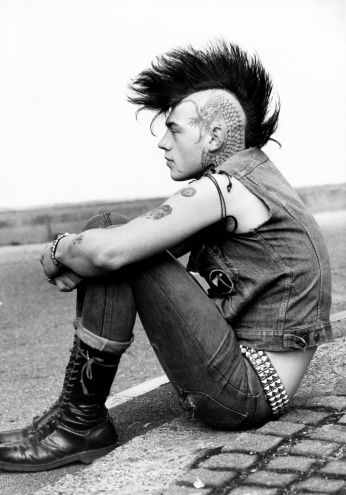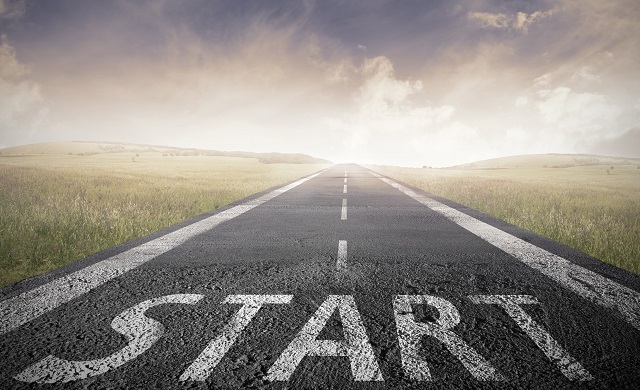By Andrew Peers
I was brought up a Catholic, but it all fell away within a month or two after leaving home at the age of 18.
Christianity simply wasn’t relevant in what I perceived as an urban jungle-world. Leaving home also marked the beginning of a descent into rebellion and antisocial behaviour bordering on the criminal; not drugs particularly, more confrontational behaviour and vandalism.
The nickname given me at the time was “Leper” and gives the general idea. Doc Martens, leather jacket studded and tippexed band names like The Damned and The Ramones, peroxide-white hair with green trench of spikes down the middle, zip trousers in which you can lose the key to your flat and so get nicked by three police officers chasing you, crombie coat etc.—the less said about the kamikaze adventures of those punk rocker days the better.
A few years further on, the fuel tank of hatred finally ran out.
Unfortunately, very unfortunately, everything then froze over into something far more pernicious: indifference. People think that hell is full of fire and brimstone but Dante in his Divine Commedia describes the ninth and lowest ring of hell as completely icebound. If you ask me, Dante has it dead right. I know because, “been there, done that, got the T-shirt…”
Metanoia
23 years old and out of necessity lodging with a friend, I heard a Buddhist monk giving a talk on the radio. “Noble eightfold path….right view…” Yes mate, whatever. “All is suffering…” Aha! I instantly recognized this one as my own experience. This was relevant.
To kill the hours of insomnia during those bleak days, I followed the programme up and began reading, even seriously considered shaving my head and becoming a Buddhist monk. Yet what I read only nudged me slowly but surely back to my own roots again.
I could’ve spit because Christianity always meant forgiving people—including parents—and there was much to forgive.
Yet I was tired of myself and becoming physically weaker. An inexplicable inner pressure mounted as if I was trapped inside myself and couldn’t get out, all doors and windows shuttered and locked.
Things finally came to a head one night when I suddenly arrived in my spirit on a cliff edge. A choice had to be made.
Either jump out into the pitch blackness and give up responsibility for myself (insanity) or just give up struggling and turn around, turn back.
I turned over in bed and found the door of the prison cell of my mind standing open. Stammering out some words, I discovered that to pray was to pray to someone/something. I felt a new presence and trusted it.
Later I bought a D-I-Y book on meditation and almost immediately discovered a totally unsuspected metaphysical dimension to life.
Becoming a monk however—especially one of the Trappist variety—was certainly not my idea. It was the result of fully opening out all options before this presence and then taking it on trust that the way that then opened up would be best.
And so began my second chance in life, back from the brink and this time guided by something in me.
The interior hints were strong enough to lead me to enter a conservative Trappist abbey in England in 1990, marking the first real confrontation with my shadow and the beginning of a long drawn-out war of attrition that lasted almost the whole of the 90’s, when I was also cut off from outside contact with the world. It was like travelling a great distance in a tunnel under a mountain. I was a frozen beggar and although I had had a brief taste of it, I hadn’t yet grasped the generous nature of divine love.
Love as I knew it always came with an if.
But sound of fanfare! I emerged blinking into the daylight and grew stronger, eventually leaving the monastery to return again to the world again. I looked around at things out of different eyes.
Enlightenment
If you got enlightenment, what would you do with it? As western individualists seeking the liberation of enlightenment, there is the danger that we do so in the attempt to break out of the dynamic of compassion, of death-in-life, into an illusory and elitist freedom that seeks to evade it, refuses to undergo it.
Real enlightenment is surely not this type of freedom. Any breaking out to be done is inevitably only to come back again to a world of moral complexity, decision-making, and the three companions of old age, sickness and death.
We break out to break back in, and look with the eyes of compassion on the world, as a mother looks in on an only child who is sick.
We are suffering in solidarity with all beings without distinction because now we see what and why suffering is and that it isn’t the final word. The reality of enlightenment is surely this great trust, the deepest kind of trust that brings a person across all dualistic bridges of faith (I believe in….) to the simple and central oneness of all faiths, to knowing and to certainty (I know, I am this, I am one).
Arrogance is believing you could ever be anything else other than this reality. Surfing a dangerous and radical punk dynamic paradoxically brought me back to right thinking, right view.
In the deepest ring of hell where all is ice, I found warmth again at the tiny flame of unconditional love that I am.
Photo: (source)
Editor: Dana Gornall
Comments
- What’s So Different About Celtic Buddhism? - February 1, 2023
- What is a Celtic Buddhist Priest? - January 5, 2023
- What is a Drala Priest? - September 18, 2018





